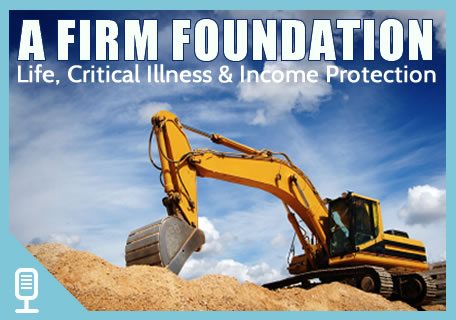 In this seventh session of the MeaningfulMoney podcast, we’re going to be talking about protecting your future.
In this seventh session of the MeaningfulMoney podcast, we’re going to be talking about protecting your future.
According to Cliff Ravenscraft, the Podcast Answer Man, the seventh episode of any podcast is a watershed. Apparently many podcasts never get past the seventh episode! But we're here, and assuming I get to an eights session, you'll know we're here for good (There will be, don't worry!)
In this session, I was going to be covering the five basic steps of financial planning (Or something like that) but that'll be next time now.
There is just no point in spending time building elaborate investment portfolios, dreaming about the perfect retirement, or worrying about tax, if all your plans can be wiped out at a stroke by premature death or serious illness. Having the rug pulled out from under your finances would be a disaster, not only for you, but potentially for those you love too.
In this session I'll be covering everything you need to KNOW and everything you need to DO to make sure your plans are protected against the worst.
Click to Listen
Podcast: Subscribe in iTunes | Play in new window | Download
Introduction
A good Financial Protection programme is the foundation on which all good financial plans are built.
I'm a Christian, brought up in the church. There's a bible story about wise and foolish builders. One man built a house on solid rock. When the storms came and the waters rose, his house stood firm. But his neighbour built his house on sand. When the storms came and the waters rose, the house was washed away.
If your finances are built on sand, it won't take much to sweep them away and render all your planning useless. A good financial foundation is made up of three types of insurance:
- Life Insurance
- Critical Illness Insurance
- Income Protection Insurance
You may not need all of these – more on this in a minute – but you need to know what they are and how they work in order to put the necessary in place
Everything you need to KNOW
So, let's deal with everything you need to know about Financial Protection
1 – How Life Insurance Works
I'll use both Insurance and Assurance in this podcast. The technical difference between the two is that insurance covers something which MAY happen, like house insurance covering the possibility of your house burning down. Assurance, on the other hand, covers something that WILL happen. everyone dies sometime, hence they call it life assurance. Practically though, the terms are interchangeable, No-one outside my professino uses the word assurance anymore.
There are two types of Life insurance
Term insurance – Has a start and end point, a fixed period of time or term, in which the person is covered. If you survive until after the end of the term, there is no payout. Video guide here – Episode 261
The amount of cover can stay level throughout the term, or it can decrease, perhaps to pay off the reducing outstanding amount on a mortgage.
Whole of Life insurance – As the name suggests, there is no end point to this type of life insurance, instead it lasts for the whole of your life. Video guide here – Episode 262
As everyone dies sometime, these policies are more expensive than term insurance. In order to make them affordable, insurance companies sometimes invest part of the premium. The idea is that if the investment performs well, the premiums can stay low, but this rarely works.
As a general rule of thumb, don't mix investment and insurance. For most purposes, term insurance is the best option. We'll talk about how much cover you need and for how long in the DO section.
2 – How Critical Illness Insurance works
Critical Illness insurance is usually term-based, and pays out on diagnosis and survival, usually for 14 days, of one of a list of specified critical illnesses. Video guide here: Episode 266
The list of Illnesses starts with the ABI, the Association of British Insurers. While the general definitions are standard, there are subtle differences between providers buried in the detail.
Critical illness is more likely to pay out than life cover – hence it is more expensive.
It can be combined with life cover in various ways:
- Life AND Critical Illness, which pays out on each event.
- Life OR Critical Illness, which pays out once, on whichever event happens first.
3 – How Income Protection works
Again, Income Protection is Term Based. Income Protection policies are usually written to last until retirement age – can be earlier, but no later than state retirement age.
Income Protection is a form of decreasing term assurance which pays out a tax free regular income if you are unable to work due to sickness or accident. You can find investment-backed versions, but these are best avoided. You can insure most, but not all of your pre-sickness GROSS salary – usually up to about 70%. Video guide here – Episode 267
Of the three types of financial protection, Income Protection is the most likely to pay out, but it can still be cost-effective due to its decreasing term nature.
You can set a deferred period, from one day to two years, and the policy will begin paying out after this period has passed from the date you become unable to work. The idea here is that you can set the policy to kick in when the sick benefits available from work end. The longer the deferment, the less likely the claim, and the cheaper the policy will be.
There are three definitions of ‘unable to work'
- Unable to do you OWN occupation – most likely to pay out
- Unable to do your OWN occupation or any any occupation for which you are SUITED due to education or experience
- Unable to do ANY occupation – least likely to pay out
4 – Your ability to earn an income is the valuable asset you have
Someone earning £35,000 per year at age 25, will earn well over £2.5 million over their working lifetime, and potentially many times more than that.
It seems blindingly obvious, but if you're dead, you can't earn. Who will look after your family then? We protect our cars and houses, but the impact of the loss of our ability to earn an income is much bigger than the loss of a house or car.
Everything you need to DO
Armed with that information, what do you need to do about protecting your own financial future?
1 – Determine how much life cover you need?
Ask yourself a couple of questions?
- • Do I have any debt?
- • Do I have any financial dependents?
If that answer to either of these is yes, you're going to need some cover.
What is the likely impact of the loss of your income? Covering the total amount of loss to your family if you die is likely to be prohibitively expensive – it could run to many millions.
Instead, use the Debt plus X rule as a guide. It's only a guide though – treat it as a minimum.
- Are you single? Cover your debt only
- In a relationship? Cover debt plus £250k each
- Got kids? Cover debt plus £500k each
This is JUST A STARTING POINT – everyone's lifestyle is different. These may seem like massive numbers to you, or nowhere near enough. Seek advice to get this as right as possible, though there are no definite answers
Remember also that you may have life cover available at work, called ‘death in service' cover. Find out about this and factor it in to your calculations.
2 – Determine how much critical illness you need
As a rule you should try to cover your mortgage and other debts. This might be expensive, but imagine fighting cancer and worrying about paying your mortgage. How much better to be mortgage free when disaster strikes?
If paying off your entire mortgage with critical illness insurance makes the premiums unaffordable, then consider this alternative: Work out five years of debt repayments and insure that amount. That would give you breathing room to get better.
Chances are you will survive most critical illnesses for quite a while, so try to put protection in place to take any worry away while you are fighting the illness.
3 – Determine how much Income Protection you need
Income Protection is the most under-used insurance type, but it's so important.
Simple rule: get the most cover you can. Remember your sick benefits from work, and work around those, so that you dont over-insure. Income Protection insurance won't pay out if you're still receiving an income.
4 – Use trusts
For life insurance especially, the use of trusts is essential. Using a trust places the life policy outside your estate. Why would you do this?
- Quick payout – no need to wait for a will to be proven and probate to be granted
- Avoids potential Inheritance Tax
- Ensures your wishes are carried out
Be careful if you have a combined life/Critical Illness policy – you should then use a split trust.
Trusts are a specialist area, you should definitely seek advice from a competent adviser, or a solicitor in this regard.
For more on the use of trusts with life insurance, see video episode 269
Summary
Loads of information here, but still only an overview of a big subject. Like all aspects of your financial planning, getting advice is, erm, advisable!
You should keep your life assurance needs under review. If you would like me to help you with this, click here: Work with Pete
As in all things, be intentional with your money – don't just let it drift! Decide you are going to get your financial foundation sorted and DO IT!
Outro
I hope that was helpful. Did I miss anything? Do you have any tips or tricks that work for you?
Do you have any questions or comments? Please leave them in the comments section below; I'll do my best to answer them
If you like what you hear on this podcast, (and we're really just getting started) please leave a rating or review on iTunes. This helps others to hear about the show and to subscribe
Next time we'll be talking about the five steps of financial planning – distilling the whole financial planning process down to five broad steps.
If you have any questions about this, go to meaningfulmoney.tv/feedback and leave a voicemail
Thanks for listening – I'll talk to you next time



Hi Pete
Love your podcasts. Regarding putting life insurance in a trust, what if you cannot find suitable people to appoint as trustees. Can you still set up a trust and leave out the trustees so the public trustee can assume the position if one dies. I do not want to use a trust corporation, or a firm that will charge me thousands for doing nothing.
Which trust type is suitable; interest in possession or discretionary for someone with a minor child and not married?